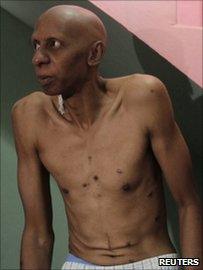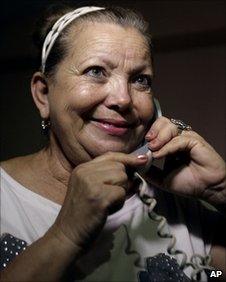EU 'should respond' to Cuba move to release prisoners
- Published

Hunger-striker Guillermo Farinas remains in a poor condition
Spain's foreign minister has called on the EU to soften its Common Position on Cuba in light of Havana's agreement to release 52 political detainees.
The 1996 policy calls for advances in human rights and democracy before relations with Cuba can be normalised.
The promise of the largest prisoner release for decades in Cuba came after talks in Havana with officials from Spain and the Roman Catholic Church.
US Secretary of State Hillary Clinton said she was encouraged by the move.
"I spoke late last night with the Spanish Foreign Minister, Mr Moratinos, and we welcome this," she told reporters in Washington.
"We think that it is a positive sign. It's something that is overdue, but nevertheless very welcome."
She did not say whether it would have an impact on US-Cuba relations.
International pressure
Speaking in Havana following Wednesday's announcement, Mr Moratinos said the largest release of Cuban dissidents since 1998 "opens a new era" in European ties with Cuba.
"I think there is no reason to maintain a Common Position any longer," he said.
"I expect my European colleagues to now respond."
Spain has in the past called for an end to the Common Position, but other EU member states have been unwilling to change the policy.
The Cuban government has been under pressure to free dissidents since one prisoner on hunger strike, Orlando Zapata Tamayo, died in February.
His death prompted another dissident, Guillermo Farinas, to launch a hunger strike that has lasted more than 130 days.
Cuba has always denied that it has political prisoners, calling them mercenaries paid by the United States to undermine Havana's rule, says the BBC's Michael Voss in the capital.
But President Raul Castro has been stung by the strength of international criticism following the death of Mr Tamayo in February, our correspondent adds.
'Forced exile'
Agreement to release the prisoners came after talks between Mr Castro and Havana's Roman Catholic Archbishop, Cardinal Jaime Ortega.
The accord was announced by Church officials in Havana.
Mr Moratinos and his Cuban counterpart, Bruno Rodriguez, were also present at the meeting in Havana.
Cardinal Ortega said five detainees - whose names were not released - would be freed soon and allowed to depart for Spain, accompanied by their relatives.
Mr Moratinos said that Spain was willing to take in all 52 prisoners, who were arrested in a major government crackdown in 2003.

Laura Pollan's husband is among the political prisoners being held
The releases will leave 110 political prisoners in Cuban jails, according to a count by the island's leading human rights group, the Cuban Commission on Human Rights.
Commission spokesman Elizardo Sanchez said he was surprised that the government was releasing so many detainees but he added that the move did "not mean a significant improvement in the terrible situation of human rights that exists in Cuba".
He argued that "forced exile in Spain" was not the same as unconditional freedom, and said he believed the Cuban government was "pursuing short-term political goals as well as purely PR ends".
Laura Pollan, leader of the dissident group Ladies in White and wife of jailed dissident Hector Maceda, said her group sensed that Cuba was "at the doors of a... significant change".
She told the Associated Press news agency that she hoped it would be "a true change, the first steps of a true freedom, of a true democracy".
But she added that she thought the government might not follow through with its promise: "I don't think they will let everyone go; I think only some will be."
A spokesman for Human Rights Watch, a US-based campaign group, welcomed the news but said: "The government makes a show of releasing prisoners but then it does nothing to dismantle the repressive machinery it has in place to imprison people and it continues arresting them."
Dissident Martha Beatriz Roque said the news of the release was not a triumph for Mr Moratinos or for the Church.
"If this [the release] comes about, it will be thanks to the death of Zapata, to the Ladies in White, who have been so harassed by police, and thanks also to the [hunger] strike by Farinas," she said.
The last time Cuba released a significant number of political prisoners was after Pope John Paul II visited in 1998, when 101 were set free.
Twenty years before that, Fidel Castro freed 3,600 political prisoners after meeting Cuban exiles.
'Facing death'
There was no immediate word from Mr Farinas, 48, who has said that he will only end his hunger strike when all political prisoners in Cuba are released.
Recent news of his condition was reported in Cuban state media, which usually ignore dissident protests.
The official communist party newspaper Granma published an interview with the doctor leading his treatment, Armando Caballero.
Dr Caballero said the patient had gained weight due to intravenous feeding since being moved to hospital on 11 March after collapsing at his home in Santa Clara.
But a blood clot had formed in his neck and he was also suffering from an infection that could make further intravenous feeding impossible, the doctor said on Saturday.
The authorities have not identified the political prisoners to be freed.
Below are some of your comments on this story.
Carlo Mendes, San Andreas, Cuba, says:
It is long overdue. I think this is a new beginning for Cuba.
Radan Hernandez, Germany, says:
I am from Cuba; and I do not think that this move will help Cuba's poor respect for human rights inside the island. People need more than a place to escape. It's sad to see the EU and the US letting this happen. Cubans have no choice. We need freedom, and a real improvement in human rights, like the exit permit (white card) or letting doctors and every single Cuban living abroad visit the island. It's not just Castro's island. It's OUR island.
George, New York, US, says:
This is only a very small step by the communist government, there are still hundreds of political prisoners remaining in Cuba who are little known abroad. The US should keep its current position on Cuba until this barbarian regime is finally gone.
Rolando Gamez, Miami, US, says:
Who in this world can not understand that this is another charade from these tyrants? They are going to release the political prisoners and kick the out of their own country to exile. Big deal! They get them in the most outrageous prison and then exile them so they don't infect other people with their dream of freedom for their own countries.
John Walsh, Moscow, Russia, says:
Every path to freedom and democracy starts with the initial tentative step. We may not see it today or tomorrow, but the foundations are being laid.
Raymond Denson, Thunder Bay, Canada, says:
May we now hope that the US will follow Cuba's good example and release political prisoners now held in Guantanamo and similar locations?
Ada Castilla, Silver Spring, MD, US, says:
The strategy of lightening the fist is an old one and one that has served the Castro regime well. Particularly now when the brave prisoners have gone on interminable hunger strikes, when the wives of prisoners, the Ladies in White, have risked being beaten on the streets and when a humble black patriot, Zapata, has died at the hands of his captors. The world after fifty years seems to be paying attention. With Raul Castro at the helm - who is no fool - some new players are entering the arena. Who are these players? The Catholic Church and the Spanish Government that has been commercing with the Castro government for years. These dubious institutions, themselves responsible in great part for the perpetuation of the Castro regime are now appearing as heroic appeasers. What happens now? Will the thousands of political prisoners in Cuba see the light of day? Is this disgraced island ever going to enjoy the rights of a democratic government and the dignity of free people? I just hope that Obama doesn't fall for it. It is a game, a calculative and nasty one. One that would produce a most relief for some victims of this oppressed land, but that is all.
Chrismat, London, UK, says:
Congratulations to Cuba on this move. Now let the USA show similar sense and good grace by releasing the "Miami 5", the Cubans unjustly incarcerated in American federal prisons.
Ed, Reading, UK, says:
China is violating human rights everyday, not to mention mass executions. Do they get sanctioned by the EU?, not a chance. This is to do with the USA and their bully tactics and nothing to do with so called human rights.
- Published7 July 2010
- Published19 March 2012
- Published3 July 2010